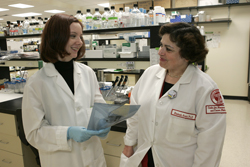Biology chair challenges students to challenge her
| When Biology’s Shohreh Amini came to Temple in 1999, she already had a reputation as a pioneering researcher in viral-induced diseases of the central nervous system, particularly those resulting from human immunodeficiency virus, or HIV.
But it wasn’t solely the opportunity to expand her research enterprise that brought Amini here. “Temple is the first institution I have been at where I am teaching undergraduates,” she said. “I had previously been at medical school-based departments where I was teaching graduate students, medical students and sometimes residents. |
 Shohreh Amini, right, in her laboratory with former student Victoria Palermo.
|
|
|
|
|
“But teaching undergraduates is the best — it is the most rewarding,” Amini said. “That is the reason I was attracted to come to Temple and the reason I stayed in the Biology Department.” And it is one of the primary reasons Amini is being honored with the 2009 Lindback Award for Distinguished Teaching. The award, funded by the Christian R. & Mary F. Lindback Foundation, was established to recognize academic excellence and outstanding teaching. After moving with the Center for NeuroVirology and Cancer Biology to the College of Science and Technology’s Biology Department from MCP Hahnemann University in 1999, Amini became the department chair in 2002. When the center — and Amini’s Laboratory for NeuroAIDS and Gene Therapy — moved to Temple’s School of Medicine to form the new Department of Neuroscience in 2005, she retained her appointment in biology and CST. It should not be surprising that Amini, who was honored with Temple’s Faculty Research Award in 2002, is being a recognized for her teaching. She believes that her research makes her a better teacher. “I honestly believe that if you do research, you will become a more effective teacher because you have to keep updated with the material,” she said. She particularly enjoys challenging her students in the classroom, as well as having her students challenge her. She wants them to go beyond her PowerPoint presentations and handouts, and she encourages them to interrupt her lectures to ask questions. “I put a percentage of the student’s final grade on class participation and attendance,” she said. “Attendance doesn’t just mean you are physically here in my classroom and your mind is elsewhere; I want the students to be mentally in the class as well. “I want them to interrupt me, ask me questions and challenge me,” said Amini. “It is OK when students ask me a question and I don’t know the answer. Then I have to go find the answer and that makes me learn too.” Amini’s love of teaching undergraduates extends beyond the classroom to the lab as well, where she also enjoys mentoring students who want to become active in research. She says when a student comes to work in her lab or signs up for an independent research course with her they often say they lack research experience. “I tell them that lack of experience is a good thing,” she says. “If you learn something the wrong way in research it is very difficult to erase. So I like them to come to the lab so I can mold them the right way from day one.” |